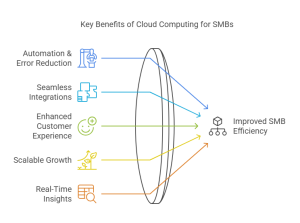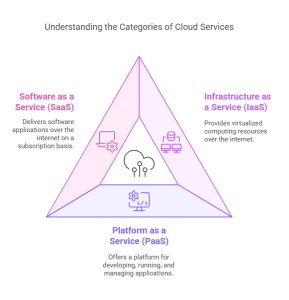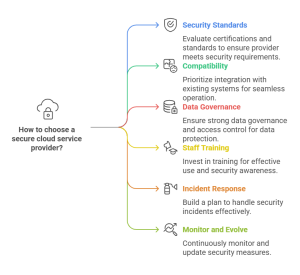Running a small or medium-sized business (SMB) today means juggling efficiency, flexibility, and growth. All while staying lean and cost-conscious. You’re not just trying to survive in a competitive market, you’re trying to grow, evolve, and outperform larger competitors who may have deeper pockets and more resources.
That’s where cloud computing steps in.
Think of cloud computing as your business’s digital toolkit: always ready, always scalable, and accessible from anywhere. Instead of pouring money into bulky infrastructure or complex IT setups, SMBs are embracing cloud-based solutions that let them operate smarter, not harder. From improving collaboration and streamlining operations to ensuring data security and reducing overhead costs, cloud technology is helping smaller businesses punch above their weight.
In fact, nearly half of all SMB leaders now use the cloud to store and back up data, and for good reason. Whether you’re a startup wearing many hats or a growing company preparing to scale, the cloud offers the flexibility and agility you need to succeed in today’s fast-paced digital landscape.
In this guide, we’ll break down exactly how does cloud computing helps small businesses. You’ll learn how it works, what benefits it offers, and why now is the time to make the switch. We’ll also walk you through real-world use cases and show you how a custom cloud solution built by the right partner, can unlock new levels of productivity, security, and innovation for your business.
What is Cloud Computing and How Does It Work?
Cloud computing delivers services like storage, applications, and processing power over the internet. Instead of owning physical hardware or installing software on individual machines, businesses access what they need through cloud platforms.
How it works:
Data is stored and managed on remote servers.
Accessible via secure internet connections, anytime and from any device.
You pay only for the services and resources you use.
For SMBs, this means no more investing in expensive servers, backups, or manual updates.
Cloud Software vs. Traditional Software
Choosing between traditional and cloud software is critical. Here’s how they compare:
| Feature |
Traditional Software |
Custom Cloud Software |
| Cost |
High upfront |
Pay-as-you-go |
| Scalability |
Limited |
Easily Scaleable |
| Accessibility |
On-site only |
Anywhere via internet |
| Updates |
Manual |
Automatic |
| Integration |
Difficult |
Seamless |
Also Read: How Custom Software Can Help SMBs Automate & Scale Operations
Common Challenges SMBs Face Without Cloud Solutions
Many SMBs struggle with daily operational bottlenecks, and most stem from outdated tools and isolated systems. Let’s break down the core challenges:
Manual Processes: Tasks like payroll, invoicing, and inventory management often require repetitive effort and slow operations.
Data Silos: Information scattered across spreadsheets, Google Docs, and CRMs limits collaboration and insight.
Lack of Scalability: As your business grows, off-the-shelf software becomes harder to scale and customize.
High Operational Costs: Hiring more staff to do repetitive tasks increases long-term overheads.
Delayed Decision-Making: Outdated data means leaders can’t make real-time decisions.
These issues don’t just cause frustration; they cost time, money, and missed opportunities.
Key Benefits of Cloud Computing for SMBs

Here are the most impactful benefits that make cloud computing a smart investment: Cloud computing and small business
1. Automation & Error Reduction
Manual data entry invites human error. Cloud-based systems automate processes, reducing mistakes and saving time.
Example: A retail store integrates its POS system with inventory, updating stock in real time and preventing overselling.
2. Seamless Integrations
Connect CRM, accounting, marketing, and logistics tools into one centralized system.
Example: A home cleaning service syncs appointment scheduling with invoicing and payment reminders.
3. Enhanced Customer Experience
Cloud-based tools allow for personalized follow-ups, real-time support, and loyalty programs.
Example: A gym uses a cloud app to send class reminders, collect feedback, and manage renewals.
4. Scalable Growth at Lower Costs
Scale up or down without expensive infrastructure or new hires.
Example: An eCommerce brand handles Black Friday spikes with automated logistics, avoiding warehouse chaos.
5. Real-Time Insights & Analytics
AI-powered dashboards help SMBs make smarter decisions based on accurate, real-time data.
Example: A restaurant chain adjusts menu prices based on weekly demand trends across locations.
Why Cloud Computing Matters for SMBs
Cloud computing levels the playing field for small businesses. It grants access to enterprise-grade tools, improves employee collaboration, enables remote work, and lets you scale effortlessly. With enhanced data security, reliable backup systems, and automation at your fingertips, cloud computing doesn’t just save money, it makes your business more agile and competitive hence it is proved as the best cloud computing for small business.
Understanding the Categories of Cloud Services

Cloud services are typically divided into three main categories each offering a different level of control, flexibility, and management. Choosing the right one depends on your business needs, resources, and how hands-on you want to be with your IT setup. Let’s break down each type and how it benefits small and medium-sized businesses (SMBs):
Infrastructure as a Service (IaaS)
IaaS provides essential IT infrastructure, including virtual servers, storage, networks, and computing power, all delivered over the internet on a pay-as-you-go basis. Think of it as renting the foundation of a digital ecosystem that you can build on.
Key Benefits for SMBs:
- Offers high flexibility and scalability as your business grows
- Reduces upfront capital costs on physical hardware
- Minimizes the complexity of managing internal IT infrastructure
This model is ideal for SMBs that want to retain control over their applications and systems while outsourcing the underlying infrastructure.
Platform as a Service (PaaS)
PaaS offers a complete environment for application development, testing, deployment, and management. It includes both the infrastructure and the tools, everything developers need to create web or mobile apps, without the hassle of managing hardware or software.
Key Benefits for SMBs:
- Simplifies and speeds up the development process
- Cuts costs related to software licensing and maintenance
- Allows developers to focus on building features, not managing backend systems
If your SMB is building custom apps or tools, PaaS provides a productive, scalable environment without the technical overhead.
Software as a Service (SaaS)
SaaS delivers fully functional software applications via the internet. You simply log in through a browser to use the app, no downloads, installations, or maintenance required. The cloud provider handles everything behind the scenes, including updates and security.
Key Benefits for SMBs:
- Easy to access and use with minimal setup
- Automatic updates keep software secure and up-to-date
- Cost-effective, with predictable subscription-based pricing
SaaS is perfect for SMBs looking for ready-to-use solutions like CRM systems, accounting software, or marketing tools.
How to Choose a Secure Cloud Service Provider: A Guide for SMBs

Here’s a detailed guide to help you evaluate cloud providers, build a secure implementation strategy, and maintain long-term data protection and compliance.
1. Evaluate Security Standards and Certifications
A reputable cloud provider should have a strong foundation of built-in security protocols and industry-recognized certifications. It’s important to look for compliance with standards such as ISO/IEC 27001 (information security), SOC 2, and GDPR, as well as clear adherence to industry-specific regulations like HIPAA or PCI-DSS.
Additionally, the provider should offer built-in security tools, including firewalls, intrusion detection systems, and data encryption, to safeguard your data. Transparent audit and reporting practices are also crucial, as they maintain trust and provide visibility into the provider’s security measures. These certifications and tools signal that the provider follows best practices for managing and securing sensitive data.
2. Prioritize Compatibility and Integration
Not every cloud solution will seamlessly integrate with your existing tech stack, so it’s important to assess whether the provider supports your current applications and systems. Consider the integration capabilities with your CRM, accounting tools, and internal databases, as well as support for open APIs and third-party services, which can simplify future upgrades and scalability.
However, Choosing a compatible solution ensures smoother transitions and fewer disruptions to your daily operations, helping your business maintain efficiency during the switch.
3. Ensure Strong Data Governance and Access Control
Security is not only about protecting against external threats but also ensuring strong internal protocols are in place. SMBs should define clear user roles and access permissions to control who can access sensitive data, while implementing multi-factor authentication (MFA) to add an extra layer of login security.
Additionally, encrypting sensitive data both at rest (stored) and in transit (while being sent or received) ensures that information remains secure. Regular data backups should also be scheduled to prevent loss in case of system failure or cyberattacks. By following these practices, SMBs can significantly reduce vulnerabilities caused by both internal errors and external threats.
4. Invest in Staff Training and Ongoing Support
Human error remains one of the biggest causes of data breaches. Educating your team is essential.
Training employees on proper cloud usage, password hygiene, and phishing awareness is essential for maintaining security. SMBs should offer ongoing support to help staff adapt to new cloud-based tools and workflows, ensuring smooth transitions.
Designating a cloud liaison within the team to manage updates and troubleshoot any issues further ensures that the technology is fully leveraged. By taking these steps, SMBs can maximize their cloud investment while ensuring it is used securely and effectively.
5. Build a Robust Incident Response Plan
Even with the best precautions, no system is 100% immune. That’s why a defined response plan is critical:
Creating a clear incident response plan is essential for handling security breaches or data leaks. It should include steps for identifying the issue, notifying internal teams and affected parties, and outlining containment and recovery actions. Being prepared helps minimize downtime, reduce data loss, and maintain customer trust.
6. Monitor, Evaluate, and Evolve
Cloud security is not a set-it-and-forget-it initiative. SMBs should:
Cloud adoption is rapidly becoming essential for SMBs, driving smarter operations and customer engagement. With edge computing and IoT, data is processed faster and closer to the source. Multi-cloud and hybrid strategies offer flexibility and better control over critical data. Serverless architecture lets teams build without managing infrastructure.
Meanwhile, AI-driven automation and stronger built-in security are making cloud platforms smarter and safer than ever.
The Future of Cloud for SMBs
As technology rapidly evolves, small and medium-sized businesses (SMBs) are set to benefit from a wave of innovation in cloud computing. The future of the cloud isn’t just about storage or cost savings, it’s about building smarter, more agile businesses. Here’s what’s on the horizon.
Cloud tech is becoming essential for everything from operations to customer service. With the rise of IoT, edge computing will enable faster decisions by processing data closer to its source.
SMBs will also adopt multi-cloud and hybrid models to get the best of all platforms while keeping critical data secure. Serverless computing will simplify development freeing teams to focus on building features, not managing infrastructure.
AI and machine learning will become more accessible, helping SMBs automate tasks, improve customer experiences, and predict trends. Meanwhile, cloud security is leveling up with built-in safeguards like zero-trust models, encryption, and smart compliance tools, keeping data protected and businesses worry-free.
Secure Your Growth with a Custom Multi-Cloud Strategy
Get expert advice on building a resilient, secure cloud environment tailored to your SMB’s needs.
Hire BitsWits Today!Wrapping Up:
Cloud computing is no longer a luxury. It’s a necessity for modern SMBs looking to grow efficiently and stay competitive. With flexible service models, enhanced security, and seamless scalability, the cloud empowers smaller businesses to work smarter, adapt faster, and deliver better customer experiences.
Whether you’re streamlining operations, building custom applications, or safeguarding sensitive data, cloud technology offers the tools to do more with less. As digital demands continue to rise, SMBs that embrace cloud innovation will be the ones leading the charge toward a more agile and future-ready business model.
FAQs














